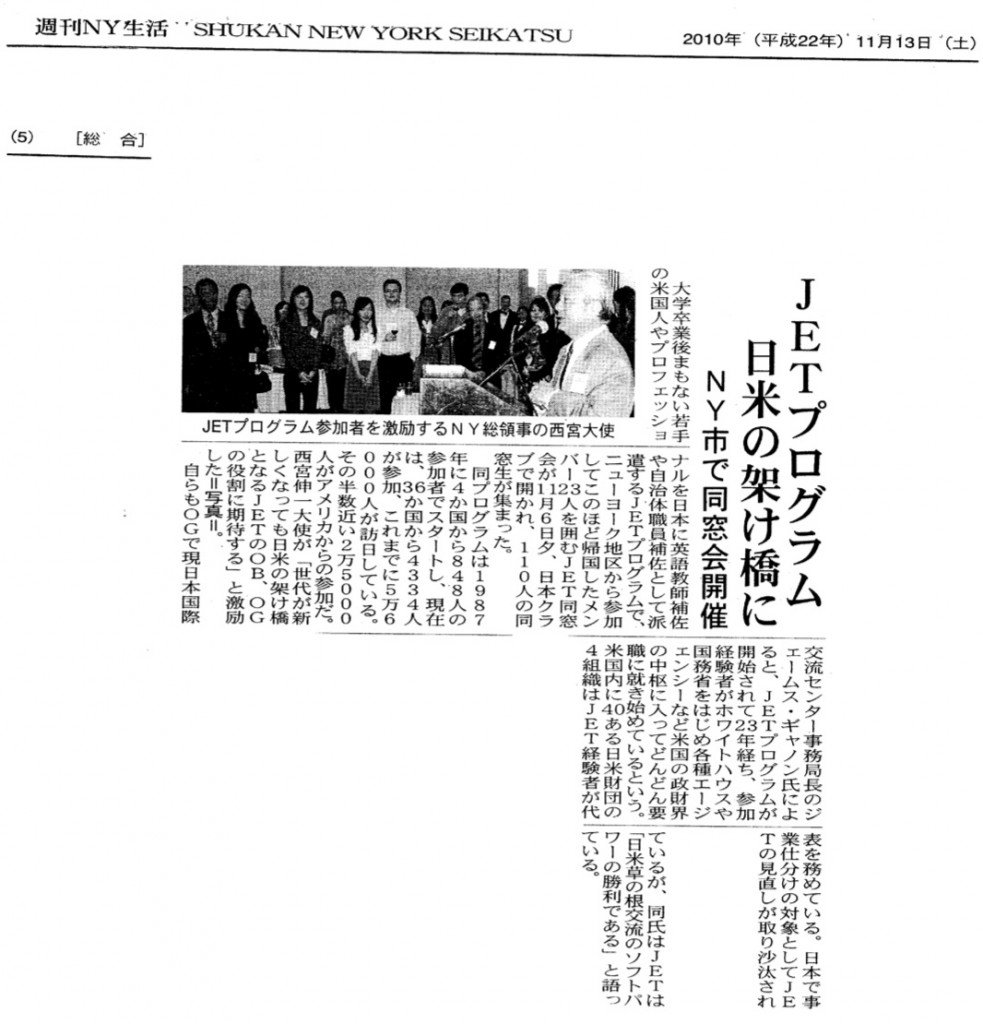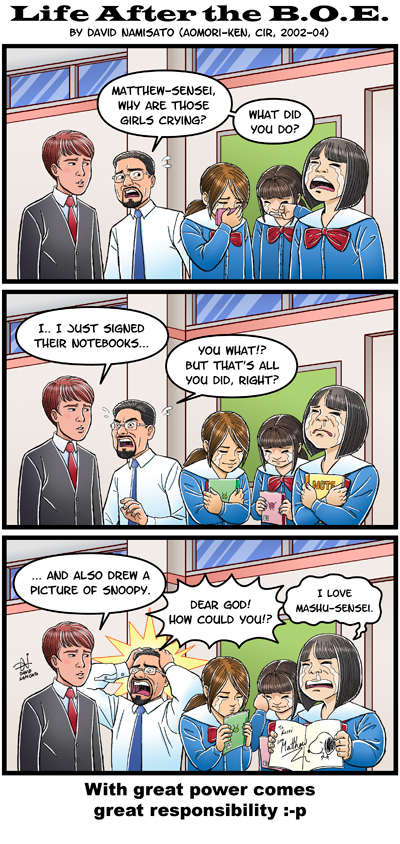 Culture Spreaders is a new feature intended to shine a spotlight on JET alums involved in spreading and sharing Japanese culture in their home countries. If you know of a good JET alum for a future post, just e-mail jetwit [at] jetwit.com tell us why you think that alum is a Culture Spreader. (Self-nominations welcome too.)
Culture Spreaders is a new feature intended to shine a spotlight on JET alums involved in spreading and sharing Japanese culture in their home countries. If you know of a good JET alum for a future post, just e-mail jetwit [at] jetwit.com tell us why you think that alum is a Culture Spreader. (Self-nominations welcome too.)
Seattle-based Bruce Rutledge (MEF Program Chiba-ken, 1985-87) is the Editor-in-Chief of Ibuki, the “Japanese Inspired Food and Lifestyle Magazine” for the Seattle/Bellevue/Portland area. (www.ibukimagazine.com)
I was in Seattle this past weekend and (thanks to JETAA Pacific Northwest President Sandra Sakai) was able to pick up a copy of the “I Love Kawaii” issue, which featured “6%Dokidoki Brings Happy Anarchy,” “Your Slice of Japan on the Eastside,” a recipe for green tea sweets, a travel article titled “Kanpai in Tokyo” and a sake article titled “Food pairing hints.” The magazine also includes an extensive Japan-related business directory for the area, including restaurants, galleries, grocery stores, etc.
In addition to his work with Ibuki, Bruce is also the founder of Chin Music Press, which has put out a number of Japan-related books and takes pride in book design.
For all his work with Ibuki and Chin Music Press, Bruce is undoubtedly a major JET alum “Culture Spreader.”
Interview with Jazz Musician Keiko Matsui
By JQ magazine’s Justin Tedaldi (CIR Kobe-shi, 2001-02) for Examiner.com. Visit his NY Japanese Culture page here to subscribe for free alerts on newly published stories.
Contemporary jazz icon Keiko Matsui began playing piano at the age of five. With sales of over 1.2 million units in the U.S. and sold-out appearances at concert halls across the world, she is one of the most recognized artists in the genre.
In addition to being the first Japanese artist to top Billboard’s contemporary jazz chart, she actively supports a range of charities, including the Y-Me Breast Cancer Organization. United Nations World Food Programme’s efforts in Africa, and California for A3M’s charity for the National Marrow Donor Program.
Matsui is now putting the final touches on her latest album, due early 2011 with Shanachie Records. I spoke with her prior to her debut three-night stand happening next week at New York’s venerable Blue Note Jazz Club.
Congratulations on your very first show at New York’s Blue Note. How do you feel about playing there and what do you expect?
Of course in New York, Blue Note is a legendary place, and I’m very happy to be there. At the same time, I have toured in many different countries, and I always feel very fortunate at the concerts to feel that music connects us beyond the culture, history, country, everything. So, I really feel that this experience at Blue Note will be very special.
When did you first come to the U.S.?
In the early ’80s.
What did you do there?
At that time, I was invited to Los Angeles by Yamaha for a special recording. I was also a student, and had the opportunity to make a sample album with Vinnie Colaiuta and Nathan East. That was my first visit to the U.S., and also my first recording there. I invited Vinnie to record on my new album, so I’m glad to see him again.
What were your memories of that experience? Did you have any culture shock?
I only had one week there, so of course I didn’t know much about the music scene in the U.S., but I was so entranced by Nathan and Vinnie’s playing. It was great creating music together with great musicians, but at that time they were so open. Maybe this is a cultural difference, because Japanese language is based on politeness and different words depending on who you talk to, but English doesn’t have that. So, Japanese people speak really strictly, I felt.
You’ve had a successful career for a long time. Why have you decided to play Blue Note now?
That’s true. For me, that’s something I’m kind of questioning myself, too. [laughs]
Click here to read the rest of the interview.
Job: Japanese autoparts manufacturer seeks interpreters plus other duties
via Quick USA. Posted by Dipika Soni (Ishikawa-ken, 2003-06). Dipika currently works as an in-house translator for PFU (a Fujitsu company) in Kahoku-shi, Ishikawa-ken. She is also the vocalist for the Japanese hardcore punk band DEGRADE.
——————————————————————————————————————
Job Position: Interpreter
Job Details:
A Japanese automotive parts manufacturing company is seeking interpreter from beginning of January 2011 till August or September, depending on the project.
Interpreting should be conducted from Japanese into English and from English into Japanese.
Your main duties will be interpreting; however, at times when interpreting is not necessary, other duties will be assigned such as administrative, accounting, IT, or other work depending on your skills.
Must have at least business level of Japanese and English, and interpreting work experience, related experience in the automobile industry are a big plus!
Candidates who do not currently live in the US are also welcome to apply.
Contact:
Mayuko Ozawa
Recruiting Consultant
Quick USA, Inc.
212-692-0063
www.919usa.com
Message from JETAA International Chair Shree Kurlekar
The following is the text of an e-mail sent out to the JETAA chapter representatives listserve by newly elected JETAA International Chair Shree Kurlekar (Shiga-ken, 2005-07). With Shree’s permission, we’re re-posting a slightly edited version here on JetWit for the benefit of the JET alumni community. For more information about JETAA International, you can visit the website at http://jetalumni.org.
Greetings members of the JET alumni community,
My name is Shree Kurlekar and I was elected Chair of JETAA International at the JETAAI meeting October 1-3 in Edinburgh, Scotland.
Here’s a list of what will be covered below:
1. Introduction to me and the new JETAAI Board
2. The Future of JET and JETAA
3. 2010-11 Action Plan for Country Representatives
*******************
JET ROI: Japan Times readers respond to Debito Arudou’s “Don’t Blame JET for Japan’s Poor English”
Back in September the Japan Times ran a column by Debito Arudou titled “Don’t Blame JET for Japan’s Poor English.” The article defended JET against criticism of non-improving English test scores. But it also waded into some generalizations that prompted some thoughtful responses. (Thanks to CLAIR-NY’s Matt Gillam for the heads up.)
Click here to see all of the responses.
The final word on JET, for now
Arudou misses the mark
Debito Arudou’s recent article on the JET (Japan Exchange and Teaching) Programme (Just Be Cause, Sept. 7) and many of the responses which followed (Have Your Say, Oct. 12):
I do agree that there are some systemic challenges educators must attempt to overcome in order to provide these kids with the English education they deserve. But Mr. Arudou’s arguments are so simultaneously inflammatory and reductive that I cannot believe a reputable publication would venture to publish them.
He is right to have concerns about the very real institutionalized handicaps in the Japanese educational system, but his ideas are so ill-articulated (“Group psychosis?” Are you kidding?) and, frankly, ignorant that I fear the real problems (and solutions) become lost in the muck.
The article itself misses the opportunity to shed light on what is actually happening in Japanese schools. Mr. Arudou is right to worry that cutting the program and withdrawing the significant foreign presence in Japan might be counter- productive, but I do not believe that that is because the Japanese are suffering from “eigo psychosis,” whatever that means. The “problems” are institutionalized at this point — a reflection of the greater cultural conflict Japan faces as it strives to look forward while staying rooted in history and tradition.
The push/pull between The Way Things Have Always Been Done and Read More
JET ROI: Shukan NY Seikatsu article on JETAANY Welcome Back Reception quotes Jim Gannon
Below is a copy of an article from Shukan NY Seikatsu (Weekly NY Life) about the JETAANY Welcome Back Reception held on November 6. The article includes some quotes from James Gannon (Ehime-ken, 1992-94) (Executive Director of the Japan Center for International Exchange (JCIE/USA), author of the July 3 “JET on the Chopping Block,” and one of the newest members of the JETAANY Board of Directors) that appeared in the November 5 op-ed written by James along with Michael Auslin (Director of Japan Studies at the American Enterprise Institute) and Paige Cottingham-Streater (Deputy Executive Director of the Maureen and Mike Mansfield Foundation).
The article is titled, “JET Program as a bridge between the US and Japan: An alumni event held in New York City.” It talks about the JET Program alumni event welcoming 23 new returnees who worked as ALTs or CIRs via the JET Program and who recently returned to the New York area. The article says that approximately 110 guests in total attended the event. And Ambassador Nishimiya encouraged the new returnees in his speech saying, “I hope you will continue to do your part building bridges between the people of Japan and the United States.” The article also introduces Mr. James Gannon as a JET alumnus and quotes from the Asahi Shimbun op-ed: “The JET Program is a ‘triumph of soft power’ in the US-Japan relations in the grassroots level.” (Thanks to Noriko Furuhata of the Consulate General of Japan in New York for help with the translation.)
Life After the B.O.E.: Autograph
Life After the B.O.E. is a comic series about the JET experience by David Namisato (Aomori-ken, 2002-2004), a professional illustrator currently living in Toronto.
Visit David’s website at www.namisato.org.




